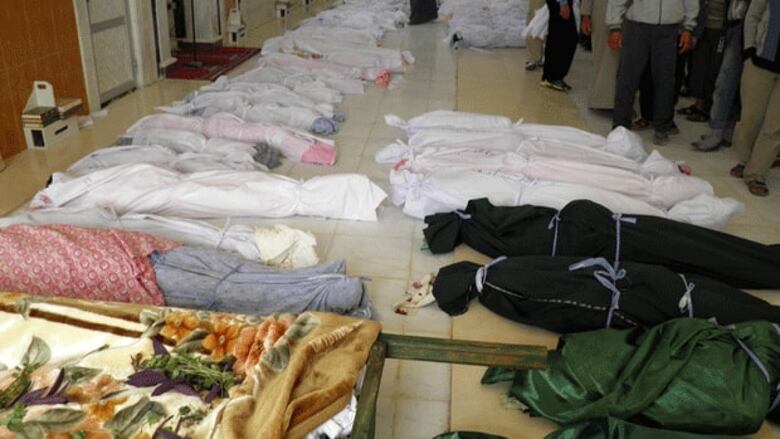Syrian children massacred by the dozens, UN says
32 children among more than 90 people killed in northwest of Homs

Gruesome video Saturday showed rows of dead Syrian children lying in a mosque in bloody shorts and T-shirts with gaping head wounds, haunting images of what activists called one of the deadliest regime attacks yet in Syria's 14-month-old uprising.
The shelling attack on Houla, a group of villages northwest of the central city of Homs, killed more than 90 people, including at least 32 children under the age of 10, the head of the UN observer team in Syria said.
The attacks sparked outrage from U.S. and other international leaders, and large protests in the suburbs of Syria's capital of Damascus and its largest city, Aleppo. It also renewed fears of the relevance of a month-old international peace plan that has not stopped almost daily violence.
Blow to ceasefire plan
The bloodshed is yet another blow to the international peace plan brokered by Annan and cast a pall over his coming visit to check on the plan's progress. The ceasefire between forces loyal to the regime of Assad and rebels seeking to topple it was supposed to start on April 12 but has never really taken hold, with new killings every day.
The UN put the death toll weeks ago at more than 9,000.
Hundreds have been killed since.
The grisly images were condemned by anti-regime groups and political leaders around the world.
The UN denounced the attacks in a statement that appeared to hold President al-Bashar Assad's regime responsible, and the White House called the violence acts of "unspeakable and inhuman brutality."
"This appalling and brutal crime involving indiscriminate and disproportionate use of force is a flagrant violation of international law and of the commitments of the Syrian government to cease the use of heavy weapons in population centres and violence in all its forms," said UN Secretary General Ban ki-Moon and international envoy Kofi Annan. "Those responsible for perpetrating this crime must be held to account."
More than a dozen amateur videos posted online Saturday gave glimpses of the carnage, showing lines of bodies laid out in simple rooms, many with bloody faces, torsos and limbs. In some places, residents put chunks of ice on the bodies to preserve them until burial.
One two-minute video shows at least a dozen children lined up shoulder to shoulder on a checkered blanket on what appears to be the floor of a mosque. Blood trickled from one girl's mouth. One boy, appearing to be no more than eight, had his jaw blown off. The video shows flowered blankets and rugs covering several rows of other bodies.
Another video posted Saturday showed a mass grave, four bodies wide and dozens of metres long.
'They killed entire families, from parents on down to children, but they focused on the children' —Abu Yazan
Activists from Houla said Saturday that regime forces peppered the area with mortars after large demonstrations against the regime on Friday. That evening, they said, pro-regime fighters known as shabiha stormed the villages, gunning down men in the streets and stabbing women and children in their homes.
A local activist reached via Skype said regime forces fired shells at Houla, about 40 kilometres northwest of Homs.
U.S. 'horrified' by attacks
The shabiha entered the villages, raiding homes and shooting at civilians, Abu Yazan said. More than 100 people were killed, more than 40 of them children and most of them in the village of Taldaw, he said. Many had stab wounds, another activist said.
"They killed entire families, from parents on down to children, but they focused on the children," Yazan said.
The Syrian government blamed the killings on "armed terrorist groups" — a term it often uses for the opposition — but provided no details or death toll.
But like UN officials, the White House issued a statement directed at the regime.
The U.S. is "horrified" by the Houla attacks, National Security Council spokeswoman Erin Pelton said in a statement. "These acts serve as a vile testament to an illegitimate regime that responds to peaceful political protest with unspeakable and inhuman brutality."
UN observers, among more than 250 who were dispatched in recent weeks to salvage the ceasefire plan, found spent artillery tank shells at the site Saturday, and UN officials confirmed the shells were fired at residential neighbourhoods. The head of the team, Maj. Gen. Robert Mood, called the attack a "brutal tragedy."
Fears of sectarian violence
"With these new crimes, this murderous regime pushes Syria further into horror and threatens regional stability," French Foreign Minister Laurent Fabius said in a statement Saturday.
The London-based Syrian Observatory for Human Rights released an unusually harsh statement, saying Arab nations and the international community were "partners" in the killing "because of their silence about the massacres that the Syrian regime has committed."
The Houla villages are Sunni Muslim.
The forces came from an arc of nearby villages populated by Alawites, members of the offshoot of Shiite Islam to which Assad belongs, the activists said.
The activists said the Houla killings appeared to be sectarian between the two groups, raising fears that Syria's uprising, which started in March 2011 with protests calling for political reform, is edging closer to the type of war that tore apart Syria's eastern neighbour, Iraq.